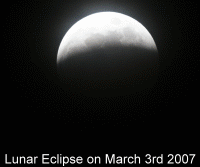How Unique Are We?
 SO, THE OTHER night there was a total lunar eclipse
SO, THE OTHER night there was a total lunar eclipse visible from Europe, Africa, and the Americas, and, like all major astronomical events that occur over the skies of Smithfield and Clayton, it was obscured almost completely by clouds. I got to see a glimpse of it through a parting in the sky, a small taste of the blood-red aura spilling over the face of the moon like a glorious disease, but it only lasted a couple of seconds before it disappeared again behind an unyielding veil of darkness. There are pictures, of course, from across the world, but the point is that it got me thinking.
visible from Europe, Africa, and the Americas, and, like all major astronomical events that occur over the skies of Smithfield and Clayton, it was obscured almost completely by clouds. I got to see a glimpse of it through a parting in the sky, a small taste of the blood-red aura spilling over the face of the moon like a glorious disease, but it only lasted a couple of seconds before it disappeared again behind an unyielding veil of darkness. There are pictures, of course, from across the world, but the point is that it got me thinking.There are people that believe the earth is exceptionally unique in its relative placement in the cosmos, as well as in the astronomical phenomena observable from earth. I've even heard claim that it is irrevocable proof that we were placed here under divine convention for the reason that nowhere else in the entire universe -- not just this galaxy of over a hundred-billion stars, mind you, but the whole universe comprised of over a hundred-billion galaxies -- can one observe a solar or lunar eclipse like the one on earth.
The truth is, eclipses, both solar and lunar, happen all the time in the universe; as a matter of fact, almost any star with an orbiting planet that itself has an orbiting satellite has eclipses. What makes the one on earth so nice is the relative similarities in size of the Sun and Moon as observed from earth -- while the Sun is approximately 400 times larger than the Moon, it is also approximately 400 times further away from us, making the two appear almost the same size. The ratio between these two numbers -- the size of the Sun and Moon as opposed to their distances away from us -- is nowhere near exact, but because they are such BIG numbers and because they are SO far away from us, the details kind of get lost in the phenomena.
But, even so, this same seemingly divine characteristic of our star and satellite is not as rare as one may imagine. Although an eclipse is simply whenever one celestial object moves into the shadow of another, this similarity in apparent size as observed from one of these celestial objects happens in our own neighborhood...just as close as in our own solar system. Five of Jupiter's satellites perform in the same manner as our Moon during eclipses, although it does have an exceptional sixty-three satellites to choose from, and that is remaining within the confines of our tiny little solar system. Branching out into the observable universe -- and we can look about 46.5 billion light-years out into space right now -- the math tells us there should be millions upon millions of extrasolar planets, and out of these millions upon millions capable of eclipses, and out of these perhaps only thousands capable of the kind of solar eclipse we enjoy here on earth.
So, the phenomenon I had the chance to glimpse the other night was perhaps not as unique, in respect to the rest of the universe, as I may have liked it to be. But, without compromising the beauty of said phenomenon, I would think it quite a waste of space if there was nothing that made one planet unique over another, and no astronomical phenomena that could perhaps be experienced only someplace other than our home planet.
Post a Comment